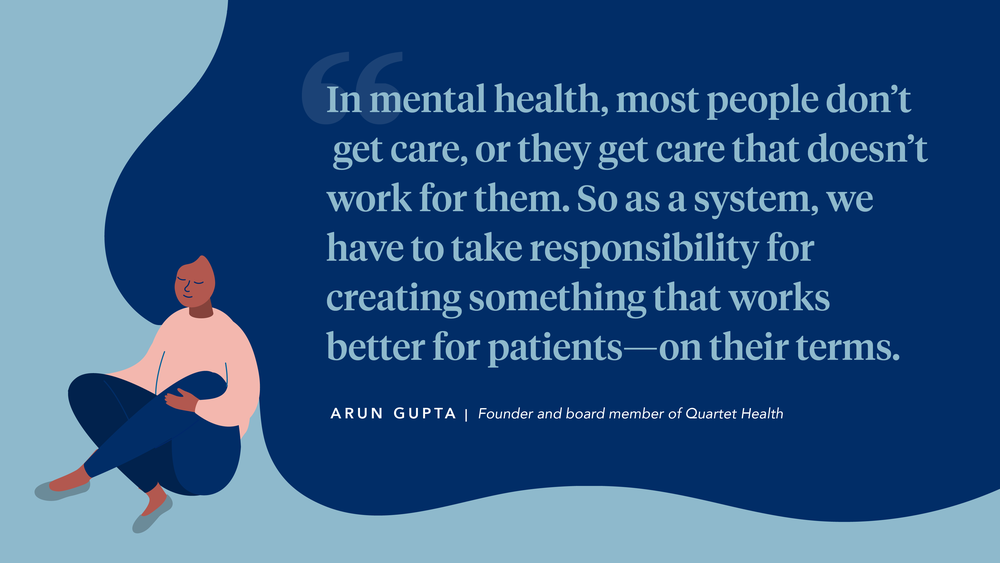At Cedar, we’ve always prioritized employee mental health and well-being—and with the COVID-19 pandemic, supporting and understanding the mental health needs of employees has become even more important. That’s why for Mental Health Awareness Month, we recently hosted Arun Gupta, founder and board member of Quartet Health, for a unique discussion with Cedar CEO and co-founder Florian Otto on using technology and data to improve mental health care.
Founded in 2014, Quartet is a mission-driven technology company that partners with insurers and health systems to make mental health care more accessible and effective. Otto and Gupta talked about how Quartet uses technology and services to reach people who need care, and what the future of mental health care might look like.
Defining mental health: what does it really mean?
As the event kicked off, Otto began with a fundamental question: What is mental health? “It really all starts from the things that are happening in your brain,” said Gupta. I think there are deeply clinical conditions in the mental health arena—things like bipolar [disorder], major depressive disorder—[…] that are clinically diagnosable and have very traditional patterns and treatment. And then there’s this broader realm, where we all just need help at times.”
Due to the pandemic, Gupta noted, people are experiencing significant stress, which takes a toll But perhaps one silver lining, he said, is that “the access to care has improved, and more people are feeling comfortable seeking care.”
Otto said that just as people experience conditions like musculoskeletal issues or eye issues, mental health is just another part of that care. Gupta agreed, noting that mental health often goes neglected as a whole within the medical system: “People go to their [doctor], and they’ll get their blood pressure checked and get blood drawn—but no one’s really asking them about their mental health,” he said. “So we really need to upgrade the incorporation of mental health into all of health care. It’s being treated as a silent, private […] part of the medical experience, and that’s a real disservice to patients.”
In search of an inspiring mission: the path to Quartet
After working as a management consultant for McKinsey & Company, Gupta and a team went on to build Accolade, an on-demand healthcare concierge for employers and health plans, where he immersed himself in the challenges of the user experience.
“I pretty quickly learned, as an analytic guy and as a technologist, that it’s all about emotion and the psychosocial. And healthcare is super complicated, and people […] don’t know what things are going to cost and they’re getting these diagnoses that are life-changing […] We’ve all had those experiences, or many of us have.”
As the beginnings of what would become Quartet formed in his mind, Gupta recalled thinking, “There has to be a better technology way forward here. We need to scale up high-quality mental health care. We need to better integrate into the medical system. We need to bring data into these treatment loops to highlight evidence-based—and value-based—treatment pathways.”
Gupta envisioned a mission-driven company that would sustain his interest and devotion, and also provide a vibrant culture for like-minded people. He knew it would not be easy. “Working on a really thorny, systemic problem like mental health, you get up every day and you just try to get a couple of points on the board. You just try to move the needle every day.”
The future of Quartet—and mental health care
Describing himself as “a data nerd at heart,” Gupta spoke of the power of digitization, and the ability to track information in real time: “The moment you digitize something, you start building data feedback loops that are very native, in a way that in the offline world is very low-fidelity and hard. So I think a high-fidelity data ecosystem is probably the biggest thing that’s coming out of the digital access model—all in service of meeting patient needs.”
Rather than thinking of other companies as Quartet competitors, he said, “We’ve distinctly chosen a more systemic approach to fixing this problem. We’re working with the big insurance companies, big health systems, primary doctors and ambulatory medicine groups. We’re trying to change the system, versus building a parallel system or a different system.” He added: “In mental health, most people don’t get care, or they get care that doesn’t work for them. So as a system, we have to take responsibility for creating something that works better for patients—on their terms.”
Gupta noted that “we are in a watershed moment in the redesign of the mental healthcare system […] If we can be the catalyst for re-centering the dialogue on the value of good mental health care, and we can create the data models to enable that, we think society at large will be willing to enable far greater access, and better service to the patients—because there’s a public health case to be made.”
Mental health and the workplace
As the conversation wrapped up, Otto acknowledged the extraordinary toll of the pandemic, saying that in the workplace, it can be helpful to be candid with others about your own mental health, and that having a safe space to do so is critical. “I think companies are responsible for the health of their employees,” he said. “You’re spending so much time there.” He asked whether as a leader, Gupta had any guidance for him around supporting mental health at work. “We care deeply about this,” said Otto.
The pandemic has been incredibly harmful on [everyone’s] mental health […] and we’ve never been through this before,” said Gupta. I think it’s a good idea to simply ask people around you, ‘How are you doing? How can I help? What’s going on?’ […] We can all play a role as mental health practitioners just by being good friends, sons, sisters, daughters, and parents.”
You can find more resources around Mental Health Awareness Month here.



